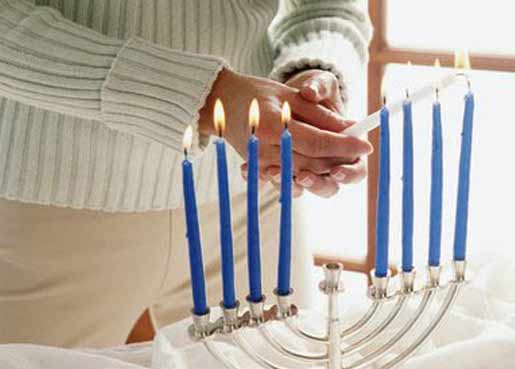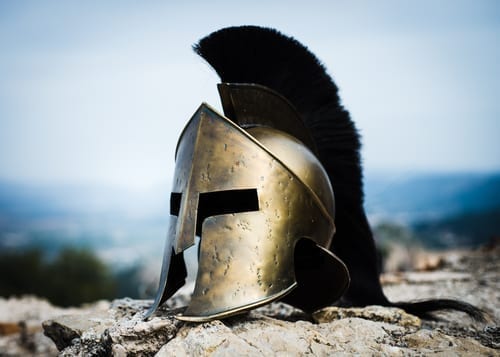Read Hanukkah: The Full Story Part 2 – Athens & Sparta
A Souvenir from Alexander
Simon the Righteous went for a walk with Alexander in Jerusalem, and showed him the Temple, and its courtyards, hidden rooms and halls, including the site of the Sanctuary and the place of the altar. The king said admiringly: “Blessed be the G-d of Israel and the G-d of this house! Fortunate are you that you are His servants, who serve before him in this place. And now I want to leave a remembrance of myself in this holy place. I will give much gold to jewelers to make a statue of me, and it will be placed in the Temple next to the Holy of Holies. In this way, I will be remembered in this holy place.”
The Jews told the king, “Our lord the king, the G-d of this House does not permit us to put a statue in it. As for the gold which you offered to give to the Temple, give it to the poor priests and to Jews who come to bow down in this house. We will instead make you a remembrance far better than the one you asked: all the children of the priests who will be born this year in all of Jerusalem, will be called after your name — Alexander.” The king liked the idea, and he donated a large amount of gold to the Temple.
Daniel's Prophecy
Alexander then asked the High Priest to ask the Urim V’tumim whether he should continue in his war with the Persian king Darius or not. The High Priest told him: “Unfortunately, since the destruction of the First Temple, we do not have in our possession the Urim V’tumim, but I will pray to G-d that He give me an answer to your question.” Indeed, his prayer was answered, and G-d put these words in his mouth: “You will go to war and will succeed.”
He also showed him the Book of Daniel where there is a prophecy speaking about him (Daniel Chapter 8):
“In the third year of Balshazzar's kingdom, a vision appeared to me — I, Daniel… And I saw in the vision that I was beside the river Ulai… And I lifted my eyes, and I saw, and behold a ram was standing before the river, and it had horns… I saw the ram goring westward, northward, and southward, and no beasts could stand before it, and no one could save [anyone] from its hand, and it did according to its will, and it grew. And I was pondering, and behold a he-goat came from the west… And it came to the horned ram that I saw standing before the river, and it ran toward it with the fury of its power. And I saw it coming up to the ram, and it fought with it, and it struck the ram and broke both of its horns, and the ram had no strength to stand before it; so it cast it to the ground and trampled it, and there was no one to save the ram from its hand… Now it came to pass when I, Daniel, perceived that vision, that I sought understanding, and behold, there stood before me one who appeared like a man… And he said to me, “Behold I am letting you know what will be at the end of the fury, for it is the end of the time. The ram that you saw, the one with the horns, represents the kings of Media and Persia. And the he-goat is the king of Greece, and the great horn that is between his eyes — that is the first king.”
Here the High Priest said to Alexander: “You are the he-goat, and Darius is the ram. You will trample him, and take the kingdom out of his hand!” The High Priest strengthened the king’s heart, and he left Jerusalem happy and in high spirits.
Since then, Alexander always treated the Jews well, and he appointed the High Priest as the governor general in the land in place of the Persian pasha, and he extended the borders of Judea.
The Hellenist Culture
Alexander left Israel and went to Egypt. This country received him with open arms, because they viewed him as freeing them from the yoke of the hated Persians. At first Alexander planned to spread the Greek culture that he so admired in all the countries that he conquered. However, during Alexander’s conquests, he also became acquainted with Eastern culture, and was impressed with it. He also realized that if he wanted to firmly rule the Eastern countries that he conquered, and establish a huge empire consisting of different peoples and cultures, he had to be considerate of these cultures.
He therefore decided to develop a new culture, which would mainly merge Greek culture with Eastern culture. To achieve this goal, Alexander founded new cities, and settled them with various peoples. The first such city was “Alexandria” in Egypt, which of course, was called after his name. He settled in this city Egyptians, Greeks, and even Jews, so they would influence each other and merge into one nation.
He founded in Alexandria institutions to promote Greek culture, such as stadiums, libraries, houses of art, together with temples devoted to idols of the Eastern peoples. A new culture came into being called “Hellenistic culture.” Alexander himself offered sacrifices in the temples of Egypt's gods, and he was declared by them as the son of the god “Amon”. Alexander wanted to be more than a military general, and even more than a king. He declared himself a god, similar to the kings of the East who were accustomed to declaring themselves as gods, and in this way he hoped to increase his authority in the eyes of the people.
Hellenistic culture influenced all the peoples of the region for many years to come. Under its influence, science was investigated, technical inventions were invented, various branches of art developed, and more. However, these positive effects were shadowed by its negative effects. The Hellenistic culture fostered idol worship, and viewed unleashed passions, body worship, lawlessness and intemperance are positive and desirable. Human morality deteriorated drastically. But there was one single culture that didn’t adopt this corrupt culture, namely the people of Israel, the holy nation who was distinct from the nations. They continued to be devoted to their ancient and glorious culture. For his part, Alexander the Great did not try to impose his culture on the Jews, because he admired greatly the Jewish sages and the Jews’ Torah.
Expansion of the Greek Kingdom and the Death of Alexander
From Egypt, Alexander continued his conquests in the direction of Babylon. The city surrendered, and its residents received him with great respect. From there he went on to the country of the Persians, the hardest nut to crack. Indeed, in this country, Alexander encountered enormous difficulties. The Persian residents who until now had ruled other nations, viewed Alexander as a foreign usurper, and fiercely opposed him. The war in a mountainous area north of Persia was very difficult for Alexander's soldiers, but nevertheless, when the Persian king was assassinated by several ministers who rebelled against him, Alexander was able to declare himself the king of Persia. When he was in the capital of Persia, he married the daughter of the Persian king and also encouraged his ministers to marry local women and merge with the locls. From Persia, Alexander returned to Babylon, with many plans to develop the huge kingdom. But before he could carry out his plans, he died of malaria before he turned 33 years old, and was buried in Alexandria, Egypt.
Splitting Alexander’s Empire
When he died, Alexander left no children; his only son was born to him after his death. Without a son and heir, Alexander’s leading generals fought over who would inherit his kingdom. They waged war among themselves for 25 years. When none of them managed to overcome his rivals and seize power, they decided to divide it between them.
Alexander’s empire was divided into four provinces, thereby completely fulfilling Daniel's prophecy (Daniel Chapter 8:8) “And the he-goat waxed exceedingly huge [the Greek empire] , and when it became strong, the great horn broke [Alexander the Great], and an appearance of four sprouted in its stead, to the four directions of the heavens… (verse 22) And the broken one, in whose stead stood four, represents four kingdoms [that] will rise from a nation, but not with its strength.” [The four kings who would succeed Alexander will not be so strong as him].
There were fierce battles between Seleucus, the satrap of Syria and Babylonia, and “Ptolemy”, the satrap of Egypt, concerning who would get the Land of Israel. The decisive battle between them took place in 3459 (301 C.E.). In this battle, Ptolemy defeated Seleucus, and took many captive Jews to Egypt. For the following 100 years, the Ptolemies ruled the Land of Israel.
Jews in Alexandria
Egypt continued to develop into a great Jewish community. The Talmud relates (Sukkah 51a):
“Rabbi Yehuda says: Who has not seen the diopelostion (“double colonnade”), [the luxurious and unique synagogue] of Alexandria of Egypt, has not see the glory of Israel … it had seventy-one cathedras of gold there, corresponding to the seventy-one elders of the Great Sanhedrin. It had a wooden platform in the middle, and the synagogue cantor stood on it, with a scarf in his hands. When the time came to say “Amen”, he would wave the scarf because not everyone could hear his voice, because of the cavernousness of the place, and they would answer him “Amen”. They did not sit mixed together, but goldsmiths sat together, and silversmiths sat together, and blacksmiths sat together, and metalworkers sat together, and weavers sat together. And when a poor person entered, he would recognize his fellow craftsman, and would join them so he could make his living among them. That enabled him to support himself and the members of his household.”





